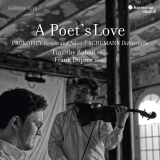(Remy Franck) – Um die Liebe dreht sich diese CD, für die der britische Bratscher Timothy Ridout Schumanns Dichterliebe für sein Instrument bearbeitet hat. Für die Stücke aus Roméo et Juliette griffen Ridout und Dupree auf die Transkription des russischen Bratschers Vadim Borisovsky (1900-1972) zurück. Es ist absolut großartig, wie sich Ridouts Viola chamäleonartig verwandelt, um sich dem Charakter der jeweiligen Nummern aus Prokofievs Ballett anzupassen. Das zeigt, wie souverän er sein Instrument beherrscht und wie groß seine Farbpalette ist. Auch rhythmisch gibt es viel Variation, und in diesem ganzen Anpassen an musikalische Tatbestände wird Ridout vom Pianisten Frank Dupree mit einer genau so großen Gestaltungsphantasie unterstützt.
Nun wird dieses kongeniale Interpretieren in der Dichterliebe noch viel aufregender, und tatsächlich vermisst man die menschliche Stimme in keinem Moment, so neu, so spannend wird das Geschichtenerzählen der beiden Instrumentalisten. Gelöst vom Text, mit, natürlich, dem Inhalt im Kopf, erlebt man die Dichterliebe in einer Darbietung, die an Nuancenreichtum wohl kaum zu überbieten ist. Und, glauben Sie mir, man hält immer wieder den Atem an, so gefühlstief, so packend wird hier musiziert. Ridout und Dupree dringen ganz tief in den seelischen Inhalt der Dichterliebe ein, mit einem manchmal nur hauchzarten, am Rande des nicht mehr Hörbaren formulierten Spiel vom Bratscher.
Nun soll man nicht meinen, das alles sei ein Zusammenwirken von Gehabe und Effekten, gewiss nicht! Ridout und Dupree vermitteln den romantischen Gehalt der Lieder einfühlsam, stilsicher und mit unwiderstehlicher Musikalität. Diese Feinarbeit, diese Kunst der geschmackvollen Nuancierung und des Kommunizierens eigener Erlebniskraft ergeben eine überragende Deutung der Schumann-Musik, und durch das gefühlsintensive Musizieren der beiden werden die Worte des Dichters nicht nur ersetzt, sondern musikalisch sublimiert.
Nur zu selten kommt es vor, dass man am Ende einer CD still und tief ergriffen verharrt und eine gewisse Zeit braucht, um wieder in die Realität zurückzufinden. Hier ist es der Fall.
Love is the subject of this CD, for which the British violist Timothy Ridout arranged Schumann’s Dichterliebe for his instrument. For the pieces from Roméo et Juliette, Ridout and Dupree resorted to the transcription by Russian violist Vadim Borisovsky (1900-1972). It is absolutely magnificent how Ridout’s viola transforms chameleon-like to fit the character of each number from Prokofiev’s ballet. It shows how confident he plays and how wide his color palette is. Ridout is supported by pianist Frank Dupree with just as much creative imagination. Now this congenial interpretation becomes even more exciting in Dichterliebe, and indeed one does not miss the human voice at any moment, so new, so exciting becomes the storytelling of the two instrumentalists. Detached from the text, with, of course, the content in mind, one experiences Dichterliebe in a performance that is probably hard to beat for richness of nuance. And, believe me, one holds one’s breath again and again, so deeply emotional, so gripping is the performance. Ridout and Dupree penetrate deeply into the spiritual content of the poet’s love, with sometimes only most delicate, on the edge of the no longer audible formulated play from the violist. Now one should not think that all this is a confluence of posturing and effects, certainly not! Ridout and Dupree convey the romantic content of the songs sensitively, stylistically and with irresistible musicality. This fine work, this art of tasteful nuance and of communicating the depth of one’s own experience, results in a superior interpretation of Schumann’s music, and through the emotionally intense music-making of the two, the words of the poet are not only replaced, but musically sublimated.
All too seldom does it happen that, at the end of a CD, one stays in silence, deeply moved, and needs some time to find the way back to reality. Here it occurs.
(Alain Steffen) – Es ist eine in allen Hinsichten lobenswerte Initiative von Harmonia Mundi, dass das label regelmäßig CDs mit neuen, talentierten Interpreten und dazu mit hochinteressanten Programmen veröffentlicht. Der junge Bratschist Timothy Ridout steht im Mittelpunkt dieser neuen Produktion und zeigt, wie schön und lebendig doch die Bratsche klingen kann, wenn sie gut gespielt ist.
Zuerst gibt es 7 Auszüge aus Prokofievs Romeo und Juli in der tollen Bearbeitung des russischen Bratschisten Vadim Borisovsky (1900-1972) zu hören. Ridout und seinem Pianisten Frank Dupree gelingt das Kunststück, den ganzen Charme der Orchesterfassung auf zwei Instrumente zu reduzieren und dabei mit einer ebenso intensiven, spielfreudigen wie auch technisch brillanten Interpretation zu glänzen.
Es folgt die Dichterliebe von Robert Schumann, die ebenfalls sehr hochkarätig gespielt wird. Die Stimme wird wunderschön von der Bratsche ersetzt und Ridouts immer lyrisches, anschmiegsames und schönes Spiel lässt keine Wünsche offen. Der narrative Charakter bleibt erhalten, die Musik gewinnt sogar teilweise an Relief, weil eben Bratsche und Klavier, also Ridout und Depree, optimal miteinander harmonieren und ein Maximum aus der Musik herausholen. Eine tolle CD, die man eigentlich haben sollte.
It is in all respects a commendable initiative of Harmonia Mundi that the label regularly releases CDs with new, talented performers and in addition with highly interesting programs. The young violist Timothy Ridout is the focus of this new production and shows how beautiful and lively the viola can sound when it is well played.
First up are 7 excerpts from Prokofiev’s Romeo and July in the terrific arrangement by Russian violist Vadim Borisovsky (1900-1972). Ridout and his pianist Frank Dupree manage the feat of reducing all the charm of the orchestral version to two instruments, with an interpretation that is as intense and fiery as it is technically brilliant.
This is followed by Robert Schumann’s Dichterliebe, which is also played to a very high standard. The voice is beautifully replaced by the viola and Ridout’s always lyrical, supple and beautiful playing leaves nothing to be desired. The narrative character remains intact, the music even gains relief to some extent, because precisely viola and piano, i.e. Ridout and Depree, harmonize perfectly with each other and get the maximum out of the music. A great CD, which one should actually have.
























